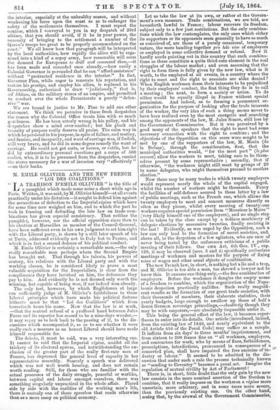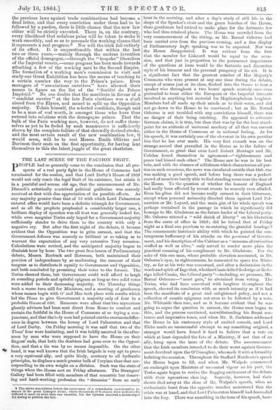M. EMILE OLLIVIER AND THE NEW FRENCH " LOI DES
COALITIONS."
" j A TRAHISON D'EMILE OLLIVIER" is the title of Li a pamphlet which made some noise a short while ago in Paris. Written, it was said, by M. 011ivier himself—at all events practically under his dictation—it sought to defend him against the accusations of defection to the Imperial regime which have for some time now weighed on him, and to which the part he took in framing and defending the late law on trade com- binations has given especial consistency. That neither the pamphlet, however, nor the official opposition since then to his election at Marseilles as member of the Council-General, have been sufficient even in his own judgment to set him right with the Liberal party, is shown by a still later speech of his at Turin, addressed evidently not to Italy but to France, and which is in fact a second defence of his political conduct. M. Emile 011ivier is certainly a remarkable man,—the only really remarkable man perhaps whom the Second Empire ha's brought out. That through his talents, his powers of oratory, his relations with the Liberal party and with the working classes, he is considered likely to prove a most valuable acquisition for the Imperialists, is clear from the compliments they have lavished on him, the deference they pay to him. And evidently he is not deemed only worth the winning, but capable of being won, if not indeed won already. The only test, however, by which Englishmen at large can sufficiently judge of M. 011ivier's faithfulness to those Liberal principles which have made his political fortune hitherto must be that " Loi des Coalitions" which from henceforth bears his name. Now that the law is at work, —that the mutual refusal of a proffered hand between Jules Fevre and its reporter has ceased to be a nine-days wonder,— it may repay us to look back to the passing of it, to the die cussions which accompanied it, so as to see whether it were really such a measure as an honest Liberal should have made himself responsible for.
The debate, it must be said, was a very interesting one. It cannot be said that the Imperial regime, amidst all the trickery of its electoral system, and notwithstanding the ex- clusion of the greater part of the really first-rate men of France, has depressed the general level of capacity in her representative assembly. Scarcely a speech was delivered which was not well worth hearing, and does not remain worth reading. Still, for those who are familiar with the actual processes of the daily struggle, peaceful or warlike, between capital and labour amongst ourselves, there was something singularly unpractical in the whole affair. Placed side by side with the realities of the working man's life, there is scarcely one of these speeches that reads otherwise than as a mere essay on political economy. Let us take the law at its own, or rather at the Govern- ment's own measure. Trade combinations, we are told, are henceforth lawful in France; labour recovers its freedom, subject only to a few just restrictions. But the only combina- tions which the law contemplates, the only ones which either its supporters or its opponents seem generally. to have so much as conceived of, are those of a purely occasional, temporary nature, the mere banding together pro Mc vice of employers or employed in some collective demand or refusal. Now it hardly needs pointing out in this country that such combina- tions as these constitute a quite third-rate element in the real struggles of the labour market ; and even assuming that the right to form them is fully given by the new law, what is it worth, to the employed at all events, in a country where the right to meet and the right to associate are alike denied ?
When English workmen deem their interests to be prejudiced by their employers' conduct, the first thing they do is to call a meeting • the next, to form a society or union. To do either would be equally illegal in France without special permission. And indeed, as to forming a permanent or- ganization for the purpose of looking after the trade interests of the worker, the very idea of such a thing seems never to have been realized even by the most energetic and searching ammg the opponents of the law, M. Jules Simon, still less by the Government Commissaries. But it was perceived by a good many of the speakers that the right to meet had some necessary connection with the right to combine ; and the objections of the Opposition on this score were sought to, be met by one of the supporters of the law, M. Morin (de la Drome), through the consideration, first, that the municipal authorities would, " for the most part " (le plus souvent) allow the workers to meet, taking care to be them- selves present by some representative ; secondly, that if otherwise, " the workmen might still meet by groups of 20 to name delegates, who might themselves proceed to another election."
Now there may be many trades in which twenty employers would represent nearly the whole of the capital engaged, whilst the number of workers might be thousands. Fancy the facilities of self-defence secured to these latter by a law of public meetings, such as the French one, which allows the twenty employers lo meet and concert measures directly as often as they please, whilst every meeting of twenty-one workers requires special permission from "Monsieur le Maire " (very likely himself one of the employers), and no single step can be taken by the class except by a tedious machinery of delegate elections by successive twenties, finally centring in the last ! Evidently, as was urged by the Opposition, such a law can only lead to the formation of secret societies, and, above all, to the despotism of a few agitators, who are sure of never being tested by the unforeseen criticisms of a public meeting of their fellows. Our own Act, 6th Geo. IV., cap. 129, it may be observed (secs. 3 and 4) specifically authorizes meetings of workmen and masters for the purpose of fixing rates of wages and other usual objects of combination. The new French law, in short, is nothing but a lie and a trap, and M. 011ivier is too able a man, too shrewd a lawyer not to know this. It ensures one thing only,—the free combination of employers. Before the workman it dangles the empty name of a freedom to combine, which the organization of the Napo- leonic despotism practically nullifies. Such really magnifi- cent results as the formation of our great trade societies, with their thousands of members, their elaborate statistics, their yearly budgets, large enough to swallow up those of half is dozen German sovereign princelings,—ebeabertig though they may be with emperors,—are absolutely impossible under it. This being the general effect of the law, it becomes super- fluous to enter into its details. One article (introduced, indeed, from the existing law of 1849, and nearly equivalent to the old Article 416 of the Penal Code) may suffice as a sample. It inflicts from six days' to three months' imprisonment, and from sixteen to 300 francs fine on " all workmen, employers, and contractors for work, who by means of fines, forbiddances, proscriptions, interdictions, pronounced in consequence of a concerted plan, shall have impaired the free exercise of in- `k dustry or labour." It seemed to be admitted in the dis- cussion that under such a rule the process technically known as "sending to Coventry" becomes a penal act. Imagine the regulation of mutual civility by Act of Parliament! There is, in short, little doubt that the only gain by the new law consists in the mere nominal assertion of the freedom to combine, that it really imposes on the workman a regime more uncertain, more arbitrary, and in some cases more severe, than the previously existing one. On the other hand, seeing that, by the avowal of the Government Commissaries, the previous laws against trade combinations had become a dead letter, and that every conviction under them had to be followed by a pardon, there is little chance that the new law either will be strictly executed. There is, on the contrary, every likelihood that sedulous pains will be taken to make it work smoothly, and so as to persaade the working classes that it represents a real progress. Nor will the trick fail entirely of its effect. It is unquestionable that within the last two or three years,—mainly through the curious invention of the official demagogue,—through the "bespoke" liberalism of the Imperial cousin,—some progress has been made towards attaching a few of the working men to the Second Empire. The formation of a working men's commission to visit and study-our Great Exhibition has been the means of teaching to a certain number the ways to the Prince's palace. Even managers of " associations ouvrieres " have allowed their names to figure on the list of the " Societe du Prince Imperial." No one doubts that the manifesto in favour of a " candidat ouvrier " at the late Paris elections was a shaft aimed from the Elysee, and meant to split up the Opposition majority. Tolain himself, the selected candidate, though said to be a man of real worth, is amongst those who have thus entered into relations with the demagogue prince. That the bulk of the Paris working men, however, do not suffer them- selves as yet to be fooled by such manoeuvres is sufficiently shown by the complete failure of that shrewdly devised stroke, and the most certain result of the new combination law, it would seem, will be to cost Messrs. Emile 011ivier and Darimon their seats on the first opportunity, for having lent themselves to this the latest juggle of the great charlatan.































 Previous page
Previous page